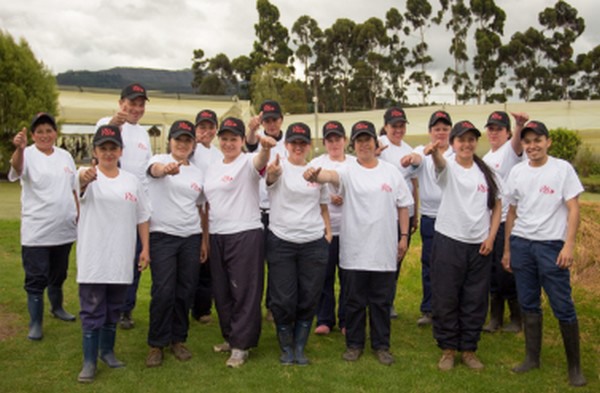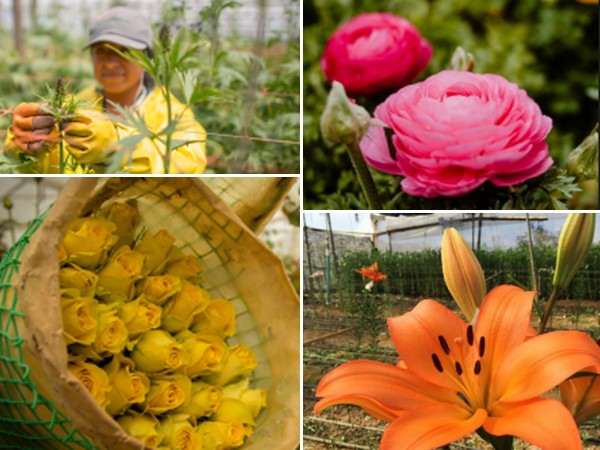When it comes to flower growers, the COVID-19 pandemic has brought some serious challenges around the world, including for Equiflor's farms in Ecuador, Colombia, and Costa Rica. In this article in which Equiflor's President and CEO, R. Victor Giorgini answers several questions, the challenges are discussed and how they are working to support their farms and workforce through these unprecedented times.
How has the COVID-19 pandemic affected Equiflor’s farms? Victor Giorgini: "This pandemic has created enormous problems in the three countries where we have production. For starters, the overall demand for most farms has decreased significantly. As well, new governmental rules regarding social distancing, stay-at-home mandates, and curfews have created a significant challenge; we have had to reduce our workforce has by as much as 50 percent.
Victor Giorgini: "This pandemic has created enormous problems in the three countries where we have production. For starters, the overall demand for most farms has decreased significantly. As well, new governmental rules regarding social distancing, stay-at-home mandates, and curfews have created a significant challenge; we have had to reduce our workforce has by as much as 50 percent.
Although there has been no government relief for businesses or workers in these countries, our workforce has been extremely understanding of the situation. They have willingly supported the necessary changes while realizing that we all need to secure a viable business in the long run. Unlike the United States, where staff can be furloughed or laid off, these countries have strong labor laws, and farmers aren’t allowed to lay off workers. Therefore, good, honest communication with our workforce has been critical in finding solutions that provide flexibility while allowing us to manage this unprecedented situation.
At the same time, it’s essential to understand that a farm cannot just close. Even if we don’t harvest or ship a single stem, we need to have a sizable workforce onboard to maintain the health of the plants. For most farms, other than people, the plants are their most valuable asset. Our rose farms, for example, need to be irrigated, fertilized, and fumigated to maintain healthy plants while waiting for this situation to be behind us. This forces us to find the most cost-effective ways to keep our farms healthy and keep production going.
As demand has decreased, given the unknowns, we have had to make the drastic decision to prune a high percentage of plants and discard a lot of the unsold production; this has helped us reduce labor. This also allowed us to remove a significant amount of foliage from many varieties to improve the ventilation on the plants and prevent diseases. On some varieties, we implemented a full Valentine’s-like pruning to stop production and reduce the labor required to manage these plants for the next 90 to 100 days. Once we return to a new normal, we can reprogram those plants to start once again producing."

How have governmental restrictions affected Equiflor's farms?
Ecuador
"Ecuador has similar social distancing rules to Colombia and Costa Rica. However, the Ecuadorian government has also imposed a mandatory curfew that begins at 2:00 PM every day. Additionally, the government has completely restricted traffic from circulating on weekends. For most farms, this means that they will be shutting down operations mid-day to allow their workforce enough time to return home before 2:00 PM; otherwise, they could face severe penalties imposed by the government."
Colombia
"In Colombia, some of the challenges include social distancing and making sure workers don’t gather in large groups. However, unlike Ecuador, the Colombian government imposed a 4:00 PM curfew in only a couple of regions of the Savanna of Bogota, allowing our workforce to complete most necessary daily tasks to maintain the farms and keep production healthy."
Costa Rica
"Costa Rica is also actively promoting social distancing and safety guidelines, similar to the ones implemented across the United States. Although they have not officially implemented a curfew, they have put in place an official stay-at-home order to reduce the spread of the virus; they will enforce this order during Easter weekend. Much like Colombia and Ecuador, there is no government relief for businesses or the workforce."

Is there anything else you would like our readers to know?
"With the arrival of the Coronavirus, we are forced, as individuals, to re-evaluate our priorities. We must give the utmost importance to protecting our health, the health of our family members, our workforce, and, ultimately, our businesses.
As business leaders, we must also continue making the necessary changes to promote social distancing and safety guidelines while making sure our businesses remain viable once we reach a new level of normalcy. Until then, we are committed to maintaining a well-balanced inventory of fresh flowers daily to support our customers and our growers.
I feel it is important to emphasize that this situation is forcing us to change the way we manage our farms and production completely. We are focusing our attention and efforts to keeping our workforce safe and healthy while also meeting all other government regulations to stop the spread of the virus. In doing so, our response time to immediate market demands and last-minute requests could be affected. I only ask that our readers fully understand the situation and make every effort to communicate their needs as soon as possible. That will give us the best opportunity to fulfill those needs."
For more informati on
on
Equiflor
www.equiflor.com
